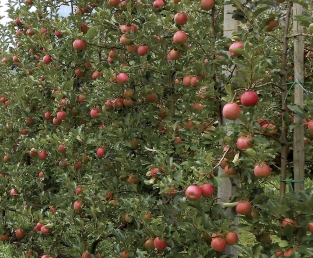Apple trees make wonderful additions to any garden. The fruit can either be eaten raw or cooked, and it contains a high concentration of nutrients in both preparation ways. There are numerous apple tree species available, but these columnar apple trees are increasingly gaining favor as homeowners strive to maximize their available area.
These trees are a rare and distinctive kind of this popular fruit tree. In contrast to other apple trees, they develop narrowly and straight, becoming exceptionally tall and thin. Columnar apple trees are visually distinct from standard apple trees, yet their fruit is visually identical.
Columnar apple trees are ideal for limited places and can even be planted in containers. Columnar apple trees, similar to typical apple trees, are available in a wide range of apple types, some of which are the North Pole and the Blushing Delight.
The Columnar fruit trees are more space-efficient than regular fruit trees because of their shorter width
Columnar Apple Tree Pros and Cons
. There is room for several columnar apple kinds in any garden, even the tiniest. It is distinct from the typical low-growth and extremely modest crown habit. Baby apple trees with slender trunks are known as “columns,” and their productivity is comparable to that of larger apple trees, despite their smaller size. They make a gorgeous addition to any landscape, especially when in bloom and can even serve as a pretty hedge if grown in a row along the property line.
The primary benefit of these apple tree cultivars is their high yield and exceptional tree density. Columns occupy a comparatively insignificant amount of area in the landscape. For maximum aesthetic effect, it is recommended to position them in a row along a fence or garden path rather than allocating them to their own specific space.
The columns are simple to maintain, and the harvest from low trees is mostly gathered without ladders because the fruits are within arm’s reach and everything is visible.
With the increased tolerance to scabs and powdery mildew, apple columns are now more resilient to disease than in the past. Columnar apple trees are susceptible to numerous diseases and pests. These include many kinds of insects, fungi, mold, bacteria, and viruses.
Columnar Apple Tree Growth Rate
Columnar apple trees usually do well in the south, where the winters are mild and the summers are warm and sunny. The growth of these fruit trees is dependent on their surroundings. Certain types can endure colder or hotter temperatures, so it is important to choose wisely and make sure it’s appropriate for the environment.
Columnar Apple Trees make a great privacy screen when they are planted in the ground. They are also useful for providing shade and acting as windbreaks. They grow rapidly and mostly form a privacy screen 8 to 10 feet tall. They possess a six to eight feet width and a maximum height of 12 feet. They prefer full sunlight and can survive in zones from 4 to 9.
Columnar Apple Tree Care
Like any plant, it requires some attention and care to thrive such as:
- Its water requirements differ according to the cultivar.
- During the growing season, columnar apple trees require somewhat wet soil and much more water during periods of excessive heat or drought. Once the columnar is established, it is essential to water when the top 2 inches of the soil feel dry. Slowly water the soil to make sure that it gets moist everywhere.
- These little apple trees require pollination from various varieties. They are not self-fertile, so other apple trees must be planted nearby, preferably at a distance of between 2 and 50 feet, to produce fruit.
- Apple trees with a columnar shape cannot withstand the absence of moisture. When moving plants, it is of the utmost importance to take measures to prevent open roots from becoming dry.
- Maintain the trees’ health by fertilizing them annually, either with a slow-release fertilizer or a balanced formula administered throughout the growing season.
Columnar Apple Tree Problems
Similar to other types of fruit trees, columnar apple trees are susceptible to pests and illnesses. It is considerably easier to treat any issues due to their small size and tall stature. The most typical issues include.
The most typical issues include:
- Brown rot.
- Apple canker.
- The honey fungus.
- An apple scab.
- Poor fruiting.



